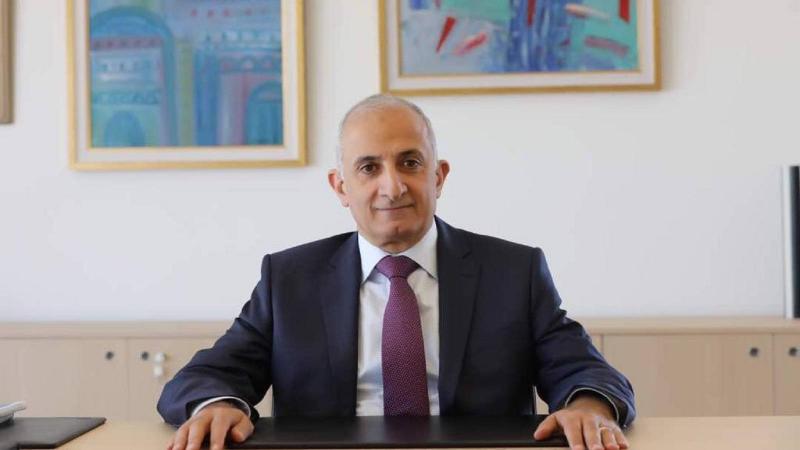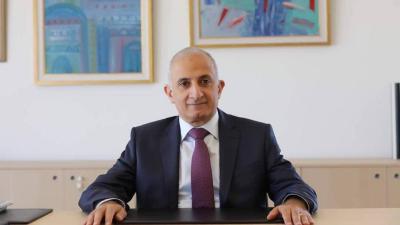The U.S. presidential envoy Amos Hochstein arrived in Beirut today, Thursday, amidst many questions about what he carries in his agenda, especially since he met with officials in Tel Aviv. There are conflicting reports; some claim his visit is routine and does not bring anything new, while others consider that he has proposals for the Lebanese side, indicating that things are moving in the right direction. However, politician Khaldoun Al-Sharif said in an interview with "Wardina": "We read the message Lebanon sent to the Security Council, in which Lebanon states it is ready to implement international resolutions, and Israel is the one opposing the implementation of these resolutions, including 1701. The message outlines the points of contention between Lebanon and Israel regarding the determination of borders, not their demarcation. Today, it is necessary that Hochstein has elements to open a dialogue regarding the determination of Lebanon's borders, but Hochstein, like the West, is requesting to cool the southern front, meaning that there is a connection between starting negotiations and cooling the front between Hezbollah and Israel. The party asserts it will not cool the front until the ceasefire in Gaza is achieved. Thus, the scene is as follows: the connection between Gaza and the south on one hand, and Lebanon's readiness to affirm its borders and Israel's readiness to begin negotiations, alongside American readiness to mediate."
Al-Sharif considers that "the main problem today is not the borders, but Israel's request for Hezbollah to cease fire towards the settlements, something the party will not give to Israel before stopping the war in Gaza," confirming that "Hochstein has some elements that allow him to start negotiations regarding the land borders."
Regarding the presidential elections, Al-Sharif pointed out that "there is nothing being cooked behind the scenes regarding the election of a president. What has been proposed is still on the table, and there are serious candidates for the presidency at this moment, namely Army Commander General Joseph Aoun and former Minister Sleiman Frangieh." He noted that "the quintet will hold a very soon meeting, and after this meeting, the special envoy of the French president, Jean-Yves Le Drian, will visit Beirut. One of the most important specifications that has been agreed upon is that the president should be accepted by most of the Lebanese political parties. When this element is available, the elections will take place. We do not know what new elements Le Drian may bring in this context. Therefore, we can say that the presidential horizon remains closed."
He observed that "what the opposition is doing is a preemptive attack to block the path of the Hezbollah-supported candidate." In light of discussions about a major settlement in the region following the Gaza war, which may come at the expense of Lebanon, which is suffering from a presidential vacuum and an interim government, in addition to deep disagreements among political entities regarding major national issues, Al-Sharif clarified to our site that "the situation in Gaza determines where the settlement will go. Will it benefit the Palestinians or the Israelis? Furthermore, Lebanon will undoubtedly be part of the settlement. The Gaza war has changed the dynamics of the conflict and the dynamics of the settlement."
He argued that "the settlement will include the name of the president as well as the name of the prime minister and will return Lebanon its rights concerning land borders," stressing that "the war in Gaza cannot be stopped except at the request of the United States, which holds the key to war and peace. Therefore, Israel is waiting for the American request to stop the war, which has not happened to date. However, I believe that the war will not last long because Israel no longer has the capacity to continue, and the Americans have the intention to halt this war."
He stated that "there is serious work behind the scenes between the French and Qataris with Hezbollah to spare Lebanon from slipping into war," pointing out that "wars do not follow rules, meaning that it is impossible to predict any slip that might occur at any moment due to any battlefield development."
Al-Sharif affirmed, "We are currently at a very crucial and important moment, meaning that we could suddenly slip into war, but the moment we surpass the war, we enter an era of settlements, which means cooling tensions. This is not optimism but rather the natural context of things; if we do not reach a settlement, we will continue in crisis until the next parliamentary elections."




